- Home
- Michael Grant
Lies Page 10
Lies Read online
Page 10
His head snapped up. “What about her?”
“She’s sitting in Howard and Orc’s living room.”
THIRTEEN
45 HOURS, 16 MINUTES
ORC HAD ENDED up crushing every couch or bed Howard had ever found for him. Not immediately, not as soon as he sat down, but within a few days.
That had never stopped Howard. He just kept on trying. The current arrangement was more bed than couch or chair. Three king-size mattresses piled one atop the other and pushed into a corner so that Orc could sit up if he chose by leaning against the walls. A plastic tarp went over the top of the mattress pile. Orc liked to drink. And sometimes when Orc had enough to drink, he might wet the bed. Sometimes he vomited all over it. And then Howard would gather the corners of the tarp and drag it into the backyard to join the pile of similar fouled sheets, broken furniture, puke-reeking mattress pads, and so on that covered most of the yard.
No one had any real idea how much Orc weighed, but he was not light, that was for sure. But not fat, either.
Orc had suffered one of the strangest and most disturbing of mutations. He’d been attacked and very badly hurt by coyotes. Very badly. Large portions of him had been eaten by the ravenous wild beasts.
But he had not died. The torn, mangled, massacred portions of his body had been replaced by a substance that looked like damp gravel. It made a soft slurry sound when he moved.
All that was left of Orc’s own skin was a patch around his mouth and one cheek. It seemed unbearably delicate to Howard. Howard could see it, pink flesh turned putty-colored in the unnatural green light.
Orc was awake but just barely. And only because Howard had lied to him and told him he was out of booze.
Orc watched balefully from his perch in the corner as the girl sat in the chair Howard had dragged in from the kitchen.
“You want some water?” Howard asked her.
“Yes, please,” the girl said.
Howard, hands shaking, filled a glass from the gallon jug. He handed it to her. She took it with both dirt-caked hands and raised it to her puffy lips.
She drank it all.
Normal. Perfectly normal except for the fact that there was absolutely nothing normal about this.
“You want more?” Howard asked her.
Brittney handed the glass back. “No, thank you.”
Howard steadied his breath and shaking fingers and took it. Almost dropped it. Set it down and then it did topple off the edge of the table. It didn’t smash, it bounced on the wood, but the sound seemed very loud, anyway. Howard flinched.
The knock at the door was comforting by contrast.
“Thank God,” Howard muttered, and ran to answer it.
Sam, with Taylor. Sam looking grim. Well, that was normal enough. Poor Sammy had lost some of his happy-go-lucky surfer boy sparkle.
“Howard,” Sam said in that voice he used when he was trying to hide his contempt.
But there was more going on with Sam. Even shaking with fear, Howard saw it. Something strange about the way he was reacting.
“Hey, thanks for stopping by,” Howard said. “I’d offer you some tea and cookies, but all we have is boiled mole and artichokes. Plus, we kind of have a dead girl in the living room.”
“A dead girl?” Sam said, and there it was again. The wrong reaction. Sam was too calm and too grim.
Of course Taylor had told him. Duh. Of course. That’s why Sam wasn’t surprised. Except there was something still off about Sam’s reaction. Howard had maintained his position by being able to read people pretty well. He’d kept on Orc’s good side for a long time, and managed, despite everything, to wrangle a place on the town council. Despite the fact that Sam surely suspected Howard was the one selling most of the illegal substances in Perdido Beach.
Sam stood there looking at Brittney. Who looked right back at him. Like maybe Sam was a teacher getting ready to ask her a question.
Brittney, can you explain the significance of the Missouri Compromise?
No? Well, then, young lady, you need to go back and reread the assignment.
Oh, and by the way: why are you not dead?
“Hello, Brittney,” Sam said.
“Hi, Sam,” Brittney said.
There was mud even in her braces, Howard noticed. Washed out only a little by the water. He could see a tiny piece of gravel wedged between chrome wires next to Brittney’s left canine.
Weird thing to notice, Howard thought.
Yeah, that’s what’s weird. Not that she’s sitting here chatting.
“How did you get here?” Sam asked.
Brittney shrugged. “I guess I walked. I don’t remember.”
Orc spoke for the first time in his low grumble. “She was standing on the porch when I stepped out to take a whiz.”
Sam glanced at Howard, who nodded.
“Do you know where you are?” Sam asked her.
“Sure. I’m…,” Brittney began. She frowned. Then the frown line disappeared. “I’m here.”
“You know all of us?”
She nodded slowly. “Sam. Howard. Taylor. Orc. Tanner.”
“Tanner?” Taylor blurted.
That rocked Sam back on his heels. Howard was perplexed.
“Who is Tanner?”
“One of the littles who…,” Taylor began, then bit her lip. “He’s her little brother. He was at the day care when…”
The pieces fell into place for Howard. He’d forgotten the name. Tanner, one of the preschoolers killed at what people called the Thanksgiving Battle, or the Battle of Perdido Beach. Coyotes mad with fear. Undisciplined gunfire. Drake and Caine and Sam using all their powers.
“Where is Tanner?” Sam asked softly.
Brittney smiled at a space between Howard and Taylor. “Right where he always is.”
“Brittney, do you know what’s happened?” Sam obviously didn’t know quite how to ask the question. “Brittney, do you remember being at the power plant? Caine and Drake came—”
Her scream made everyone jump, even Orc.
A wild shriek, a shocking loud sound, full of something that could only be hatred.
“The demon!” she screamed. An animal howl followed, a sound that rose and lifted the hairs on the back of Howard’s neck and made his insides feel watery.
Suddenly she was silent.
She held up one arm. She stared at it. Like it wasn’t part of her, like it was there and she couldn’t understand why. Her forehead creased in puzzlement.
In the shocked quiet, Sam said, “Brittney, can you tell us—”
“I think I’m sleepy,” Brittney said, dropping her arm back down to her side.
“Okay,” Sam said. “I’ll, um…we’ll find someplace for you to stay the night.” He looked at Taylor. “Bounce over to Brianna’s. Tell her we’re coming.”
Howard almost laughed. Brianna would not be thrilled by this. But Sam was reaching out to someone who was unquestioningly loyal to him.
“This doesn’t leave this room,” Sam said.
“More secrets, Sammy?” Howard said.
Sam winced. But he held his ground. “People are scared enough,” he said.
“You’re asking a lot, Sammy boy,” Howard said. “After all, I’m on the council. You’re asking me to keep this from my fellow council members. I don’t need Astrid mad at me.”
“I know about your little booze-and-drug operation,” Sam said. “I’ll mess up your life.”
“Ah,” Howard said smoothly.
“Yeah. I need some time to figure this all out,” Sam said. “I don’t need people talking about…about anything.”
Howard laughed. “You mean…”
“Don’t,” Sam snapped. “Don’t even say it.”
Howard laughed and crossed his heart. “I swear. I won’t be the first to use the ‘Z’ word.” Then in a stage whisper he said, “Zom—beee.”
“She’s not a zombie, Howard. Don’t be an idiot. “She obviously has some kind of power that lets h
er regenerate. If you think about it, it’s not that different from what Lana does. After all, she’s physically back together, and she was torn up when we buried her.”
Howard laughed. “Uh-huh. Except somehow I don’t remember Lana ever crawling her way up out of a grave.”
Sam headed toward Brianna’s house. Brittney walked along behind him. Perfectly normal, Howard thought, watching them go. Just another stroll with a dead person.
Little Pete woke up.
Dark. Dark was good. Light filled his brain with too much.
It was quiet. Good. Sounds made his head hurt.
He had to be quiet himself or someone would come and bring light and noise and touching and pain and panic and it would all come at him like a tidal wave a million feet high, spinning him, crushing him, smothering him.
Then he would have to shut down. He would have to turn it all off. Hide from it. Go back to the game, back to the game, because inside the game, it was dark and quiet.
But for now, with no light and no sound and no touch, he could hold on, for just a moment, to…himself.
Hold on to…to nothing.
He knew where the game was. Just there, on the nightstand, waiting. Calling to him so softly so as not to upset him.
Nemesis, it called him.
Nemesis.
Lana had not slept. She had read and read, trying to lose herself in the book. She had a small candle, not much, but a rare thing in the FAYZ.
She lit a cigarette in the candle and sucked the smoke into her lungs. Amazing, really, how quickly she had become addicted.
Cigarettes and vodka. The bottle was half empty, sitting there on the floor beside her bed. It hadn’t worked, hadn’t helped her sleep.
Lana searched her mind for the gaiaphage. But it was not with her. For the first time since she had crawled up out of that mine shaft.
It was done with her, for now, at least.
That fact should have given her peace. But Lana knew it would return when it needed her, that it would still be able to use her. She would never be free.
“What did you do, evil old troll?” Lana asked dreamily. “What did you do with my power?”
She told herself that the monster, the gaiaphage…the Darkness…could only use the Healer to heal, and that no evil could come from that.
But she knew better. The Darkness did not reach out through the back doors of time and space and siphon off her power for no reason.
For days it had been inside her mind, using her to heal.
To heal who?
She dropped her hand to the vodka bottle, raised it to her lips, and swallowed the liquid fire.
To heal what?
FOURTEEN
30 HOURS, 25 MINUTES
ON THE FIRST day of the disappearance—or, as Sanjit secretly thought of it, the deliverance—he and his brothers and sisters had searched the entire estate.
Not one single adult had been found. No nanny, no cook, no groundskeepers—which was a relief because one of the assistant groundskeepers seemed like kind of a perv—and no maids.
They stayed together as a group, Sanjit cracking jokes to keep everyone’s spirits up.
“Are we sure we want to find anyone?” he’d asked.
“We need grown-ups,” Virtue had argued in his pedantic way.
“For what, Choo?”
“For…” This had stumped Virtue.
“What if someone gets sick?” Peace had asked.
“You feel okay?” Sanjit asked her.
“I guess so.”
“See? We’re fine.”
Despite the undeniable creepiness of the situation, Sanjit had been more relieved than worried. He didn’t like having to respond to the name “Wisdom.” He didn’t like being told what to do just about every minute of the day. He didn’t like rules. And then, suddenly, no rules.
He’d had no answer to the repeated questions from the others as to what had happened. All that seemed clear was that all the adults were gone. And the radio and phones and satellite TV were dead.
Sanjit figured he could live with that.
But the little kids, Peace, Bowie and Pixie, had been scared from the beginning. Even Choo, whom Sanjit had never seen upset, had been creeped out.
The simple silence of the empty island was oppressive. The huge house, with some rooms the kids had never even seen, rooms no one had ever used, seemed as big and as dead as a museum. And searching through the butler’s home, through Nanny’s upstairs suite, through the bungalows and dorms, left them feeling like burglars.
But everyone’s mood had improved when they returned to the main house and opened the walk-in freezer in search of a long-overdue dinner that first evening.
“They do have ice cream!” Bowie accused. “They’ve had ice cream all along. They lied to us. They have tons of ice cream.”
There were twelve big five-gallon tubs of ice cream. Sixty gallons of ice cream.
Sanjit had patted Bowie on the shoulder. “Are you really surprised, little guy? Cook weighs three hundred pounds, and Annette isn’t far behind.” Annette was the maid who cleaned the children’s rooms.
“Can we have some?”
Sanjit was surprised to be asked for permission that first time. He was the oldest, but it had not really occurred to him that he was in charge.
“You’re asking me?”
Bowie shrugged. “I guess you’re the grown-up for now.”
Sanjit smiled. “Then, as temporary adult, I decree that we have ice cream for dinner. Grab one of those tubs and five spoons and we don’t stop till we hit the bottom.”
That had kept everyone happy for a while. But at last Peace raised her hand, like she was in school.
“You don’t have to raise your hand,” Sanjit said. “What’s up?”
“What’s going to happen?”
Sanjit had considered this for a few seconds. He was not normally a thoughtful person, he knew that. He was normally a joker. Not a clown, but not someone who took life too seriously. Taking life seriously was Virtue’s job.
Back in the days when he’d lived on the Bangkok streets and alleyways there were endless dangers: sweatshop bosses who would try to kidnap you and put you to work fourteen hours a day, cops who would beat you, shopkeepers who would chase you away from their fruit displays with bamboo sticks, and always the pimps who would turn you over to strange foreign men for their own purposes.
But Sanjit had always tried to laugh and not cry. No matter how hungry, how scared, how sick, he’d never given up like some of the kids he saw. He hadn’t become brutal, though he surely had survived by stealing. And as he aged on those wondrously exciting, terrifying, never-dull streets he’d nurtured a certain swagger, a certain attitude that made him stand out. He had learned to live each day, not to worry too much about the next. If he had food for the day, if he had a box to sleep in, if the rags on his back weren’t crawling with too many lice, he was happy.
“Well, we have plenty of food,” Sanjit said, as four faces looked to him for guidance. “So, I guess what we do is just kind of hang out. Right?”
And that was answer enough for that first day. They were all weirded out. But they had always pretty much taken care of one another, not relying too much on the indifferent adults around them. So they had brushed teeth and tucked each other into bed that first night; Sanjit the last to go to his room.
Pixie had come in and slept with him. Then Peace had come, holding a blanket to tearful eyes. And later Bowie, too.
When morning came they woke on schedule. They met for breakfast, which consisted largely of toast with lots of forbidden butter and forbidden jelly and thick slatherings of forbidden Nutella.
They went outside afterward, and that’s when they noticed the strange grinding noise.
They had rushed to the cliff’s edge. A hundred feet down they saw the yacht. The yacht—a huge, beautiful, sleek white boat so big, it had its own helicopter—had run aground. The knife-sharp prow was crumpled, wedged betwee
n huge boulders. Each slight swell lifted the ship and then let it grind slowly back down.
The yacht belonged to their parents. They hadn’t even known it was coming, hadn’t known their parents were nearby.
“What happened?” Peace asked in a tremulous voice.
Virtue answered, “It ran into the island. It must have been on its way…and then…then it just ran into the island.”
“Why didn’t Captain Rocky stop it?”
“Because he is gone,” Sanjit had said. “Just like all the other grown-ups.”
Somehow at that moment it had hit Sanjit. He’d never had much affection for the two actors who called themselves his mother and father, but seeing their yacht smashed heedlessly against the rocks had brought it home.
They were alone on the island. Maybe alone in the whole world.
“Someone will come for us,” Sanjit had said, not quite sure he believed it.
So they had waited. Days. And then weeks.
And then they had begun to ration food. There was still plenty of that left. The island was stocked for parties that sometimes included a hundred guests, all coming in by helicopter or private jet.
Sanjit had seen some of the parties. Lights strewn everywhere, all kinds of famous people in fancy clothes drinking and eating and laughing too loud while the kids were kept in their rooms, occasionally hauled out to say good evening and listen to people talk about how great it was that their parents had been so generous, rescuing “these kids.”
Sanjit had never considered himself rescued.
There was still a lot of food left. But the diesel fuel that ran the generator was running out despite all their efforts to conserve.
And now there was Bowie. Sanjit could usually manage to sidestep responsibility. But he couldn’t let Bowie die.
There were only two ways on or off the island. By small boat—and they had no boat. Or helicopter. And that they had. Sort of.
The time had come to seriously examine the most impossible option.
Sanjit and Virtue found rope in the groundskeeper’s shed. Sanjit anchored one end of the rope around the not-very-secure trunk of a sapling. He hurled the other end out into the void.

 Fear
Fear Plague
Plague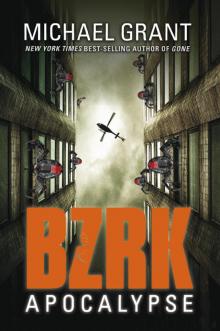 BZRK: Apocalypse
BZRK: Apocalypse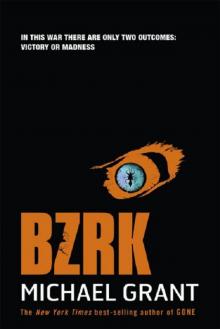 Bzrk
Bzrk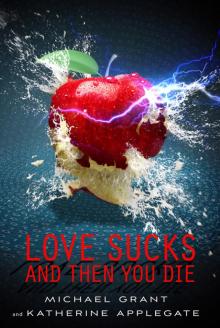 Love Sucks and Then You Die
Love Sucks and Then You Die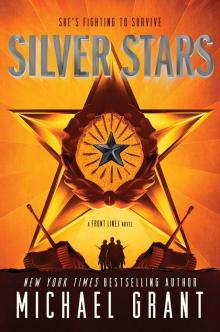 Silver Stars
Silver Stars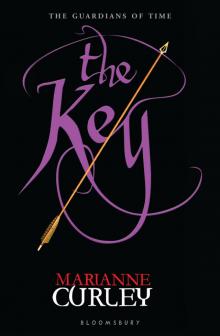 The Key
The Key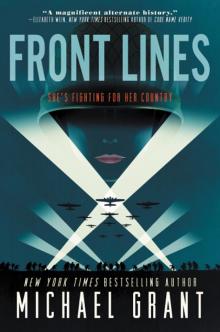 Front Lines
Front Lines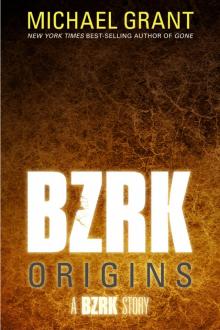 BZRK Origins
BZRK Origins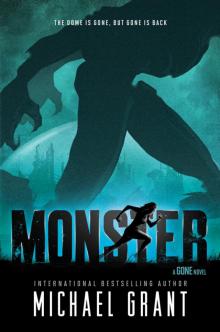 Monster
Monster Gone
Gone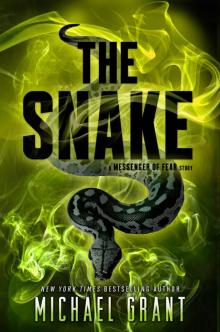 The Snake
The Snake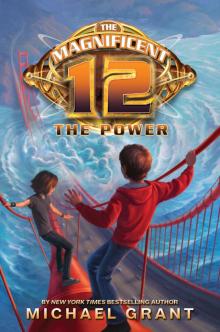 The Power
The Power Hunger
Hunger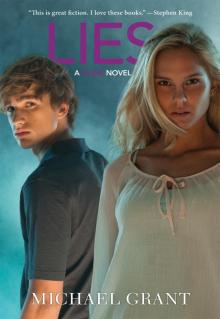 Lies
Lies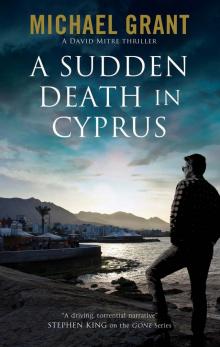 A Sudden Death in Cyprus
A Sudden Death in Cyprus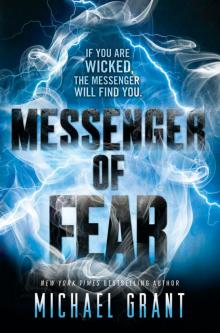 Messenger of Fear
Messenger of Fear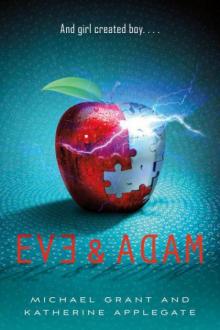 Eve & Adam
Eve & Adam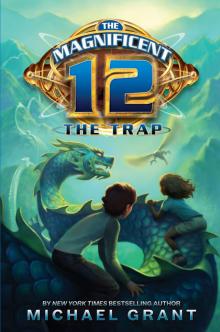 The Trap
The Trap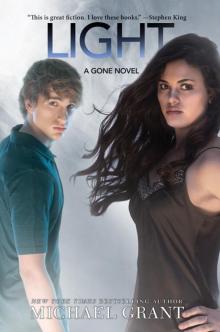 Light
Light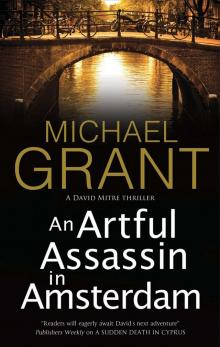 An Artful Assassin in Amsterdam
An Artful Assassin in Amsterdam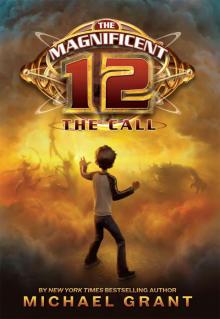 The Call
The Call Hero
Hero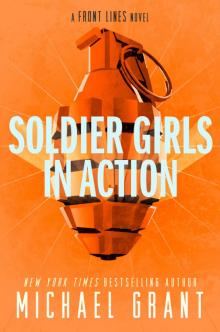 Soldier Girls in Action
Soldier Girls in Action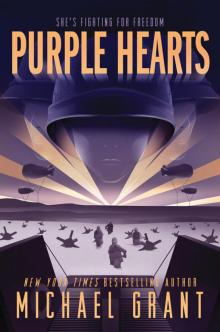 Purple Hearts
Purple Hearts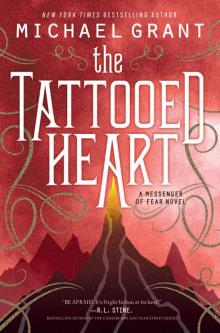 The Tattooed Heart
The Tattooed Heart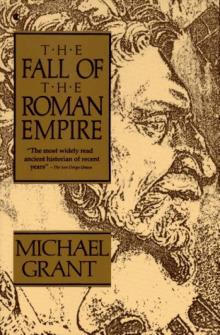 The Fall of the Roman Empire
The Fall of the Roman Empire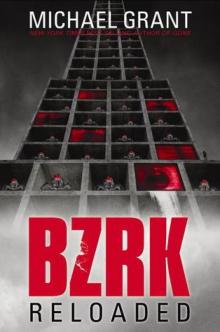 BZRK Reloaded
BZRK Reloaded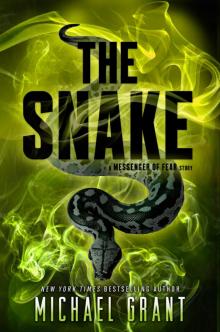 Messenger of Fear Novella #1
Messenger of Fear Novella #1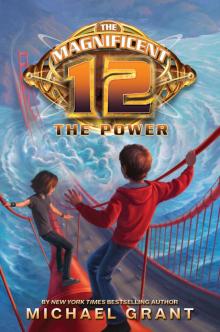 The Magnificent 12
The Magnificent 12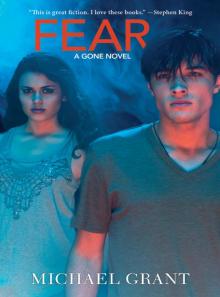 Fear: A Gone Novel
Fear: A Gone Novel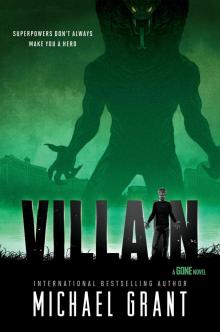 Villain
Villain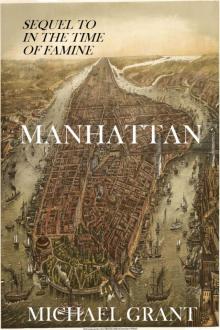 Manhattan
Manhattan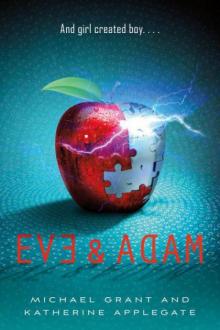 Eve and Adam
Eve and Adam Plague: A Gone Novel
Plague: A Gone Novel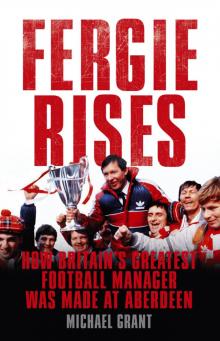 Fergie Rises
Fergie Rises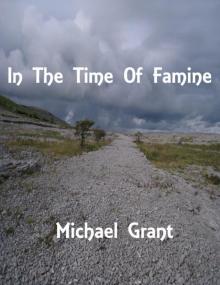 In the Time of Famine
In the Time of Famine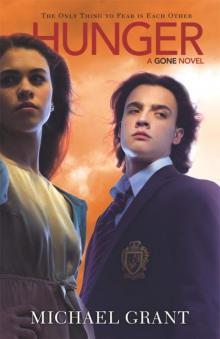 Hunger_A Gone Novel
Hunger_A Gone Novel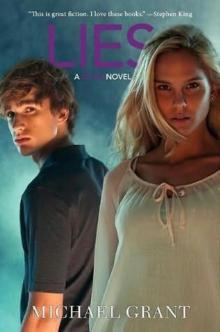 Lies g-3
Lies g-3